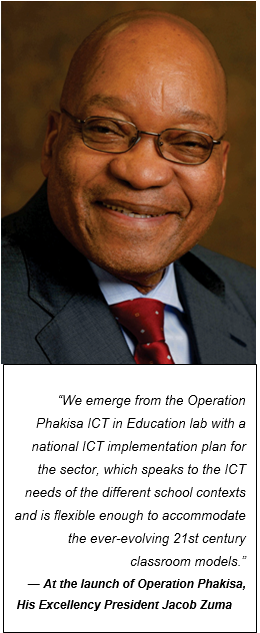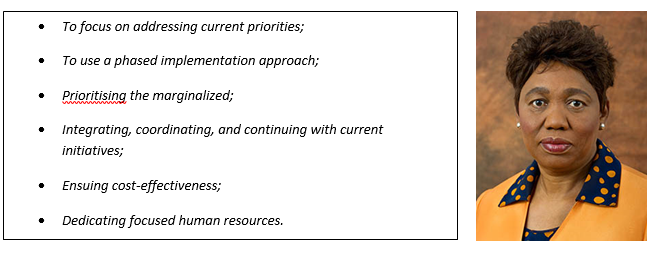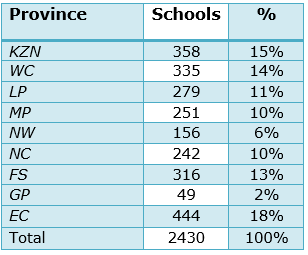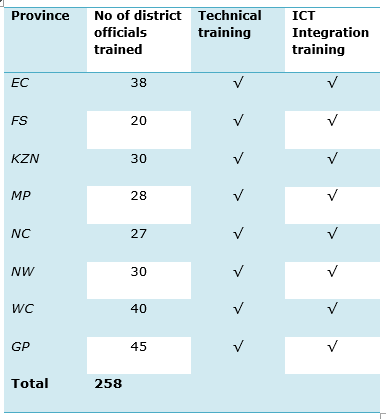Operation Phakisa: ICT in Education
The Government of South Africa adopted the Big Fast Results (BFR) problem-solving methodology, which was originally developed and implemented by the government of Malaysia. The BFR methodology facilitates the development of detailed plans with a strong theory of change, as well as strong monitoring, evaluation, reporting, and accountability frameworks which are essential for the successful implementation of national goals and priorities. It is designed to fast track the implementation of solutions on critical delivery issues highlighted in the National Development Plan (NDP). The BFR results-driven approach was adapted to the South African context. To highlight the urgency of delivery, the approach was renamed to Operation Phakisa ("phakisa” meaning "hurry up" in Sesotho).
The Main Operation Phakisa Lab process which defined the ICT initiatives for the Department of Basic Education (DBE), ran from 7 September – 2 October 2015. It has since been presented to various forums and approved at the Council of Education Ministers on 19 May 2016.
Five workstreams were identified by the Operation Phakisa lab process:
a) Connectivity
b) Devices
c) Teacher Professional Development;
d) Digital Content Development and Distribution; and
e) e-Administration
An implementation framework built around these workstreams was developed as a result of the Operation Phakisa Lab process. This Framework comprises short term (quick-win) activities, to be followed by mid- and long-term plans. The framework is guided by the following directives from the Minister of Basic Education, the Honourable Mrs Angie Motshegka:

Progress since the Lab Process(7 September 2016 )
Many exciting initiatives which were designed in the Operation Phakisa Lab process have started, and will be announced once they demonstrate success. However, in the meantime, the DBE has achieved the following milestone deliverables, aligned with the workstreams identified above.
 1. Devices and Connectivity
1. Devices and Connectivity
The Universal Services Access Obligation project (Government Gazette 37718), obliges the four Network operators (Vodacom, MTN, Cell-C and Neotel) to connect schools and provide them with End User Devices. From the inception of the Operation Phakisa lab process, 2430 schools (100.2%) have been connected out of 2425 that were to be connected by end of September 2016. However, compared to the target number of schools (3250) that are to be connected through this project by the end of the financial year, the overall percentage is 74.8%. The following table provides a breakdown with of the number of schools connected to date by each Network Operator:
of schools (3250) that are to be connected through this project by the end of the financial year, the overall percentage is 74.8%. The following table provides a breakdown with of the number of schools connected to date by each Network Operator:
connected out of 2425 that were to be connected by end of September 2016. However, compared to the target number of schools (3250) that are to be connected through this project by the end of the financial year, the overall percentage is 74.8%. The following table provides a breakdown with of the number of schools connected to date by each Network Operator:
The connectivity solution includes, for each school, a mobile trolley with devices (24 tablets for learners, 3 laptops for teachers, 2 printers, and 1 projector, 1 server, wireless access point, and  1 e-Beam).
1 e-Beam).
Overall, the USAO contribution to the current 52.2% of connected schools nation
ally is 21.8%, which represents 9.3% of the total number of schools in the country. The total number of learners benefiting from the USAO contribution is at 1,690,959 (13.7%); while the total number of teachers benefitting in these USAO-connected schools is 7290 (three laptops per school, of a target of 9750 teachers, 74.8%).
 2.Teacher Professional Development
2.Teacher Professional Development
District officials for all provinces except Limpopo (thus far) have been provided with ICT skills in partnership with Intel and Department of Telecommunications and Postal Services (DTPS), as per the following table:

Other partners, including the ETDP SETA and Microsoft, have trained a further 6394 teachers in ICT integration skills, so as to better use ICTs in pedagogy; 21375 teachers have been trained in basic computing skills, and 3517 have been trained in advanced ICT skills.
 3. Digital Content Development and Distribution
3. Digital Content Development and Distribution
Naturally, in order to ensure that education is taking place, content has to be delivered via the provided digital technologies. The DBE has achieved the following milestones in digital content provision:
• In partnership with DSTV, OVHD, StarSat and Mindset, the DBE Channel is now available on a variety of broadcast platforms. So far, 951 schools have been given access via the OVHD platform.
• The learner component of the DBE Cloud is now live and online. It is being upgraded continuously and new content is being loaded daily.
• A total of 120 digital titles of Grade 4 - 9 Natural Sciences, Technology, Physical Science, and Mathematics have been created, consisting of: 24 Grade 4 – 6 Natural Sciences and Technology workbooks; 72 Grade 7 – 9 Natural Sciences, Mathematics and Technology workbooks; and 24 Grade 10 – 12 Physical Science and Mathematics Textbooks. In addition to this, the DBE has also supplied 12 Interactive Workbooks for Grade 1, and a further 12 were sponsored by MTN Foundation for grades R-4.
 4. Monitoring and Evaluation
4. Monitoring and Evaluation
Operation Phakisa, as a presidential initiative, is closely monitored by the DPME. On the 20th and 24th of June 2016 the Hon. Deputy Minister Enver Surty hosted the Hon. Deputy Minister Bhuti Manamela in visiting schools where ICT delivery had been implemented. The visits also included monitoring of Vodacom ICT Teacher Centres in two provinces, namely, Eastern Cape and KwaZulu Natal respectively. These monitoring visits will extend to other provinces on dates that will be announced.
The DBE is required to provide Quarterly reports to DPME on progress made with regard to ICT implementation in the sector. Provinces are expected to finalise their provincial Frameworks and provide monthly reports to DBE by the 28th of every month. Thus far, most provinces have provided their ICT sector plans and aligned them with the Operation Phakisa Framework. The DBE is now able to track progress of ICT implementation across the country.
Events
Launch
The Operation Phakisa: ICT in Education La was launched by President Jacob Zuma on 02 October 2015.
President Jacob Zuma: Launch of Operation Phakisa: ICT in Education. Read more under “Documents” below.

